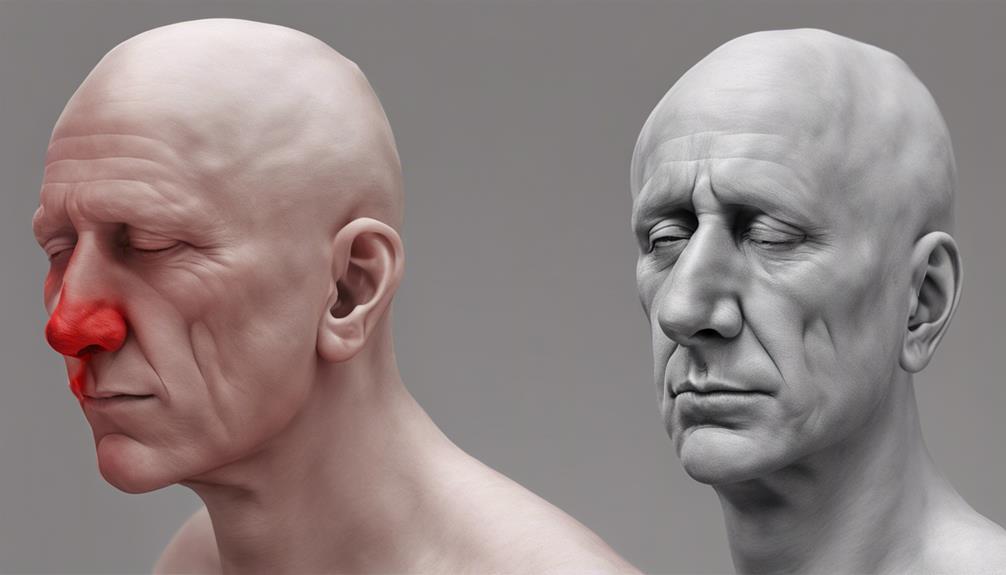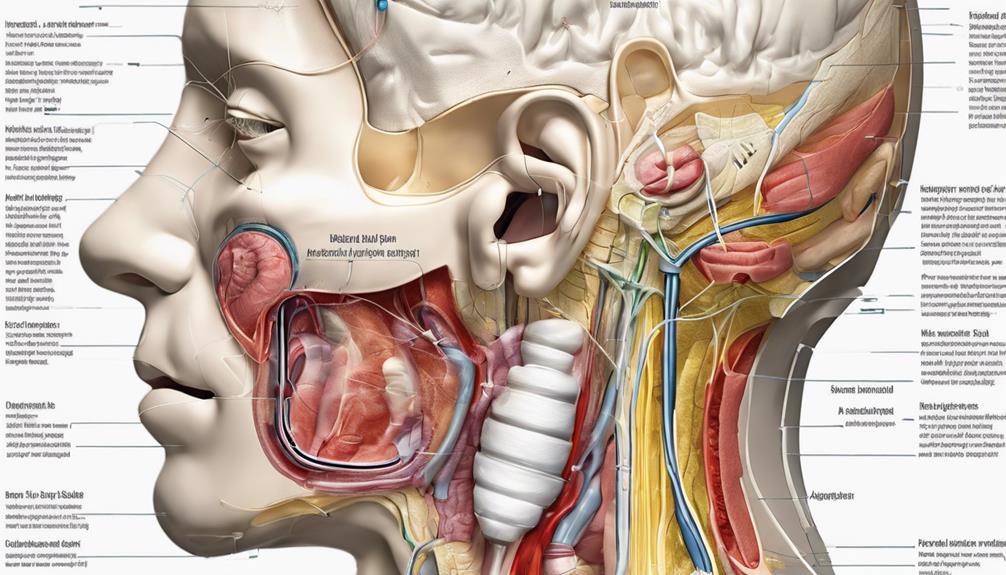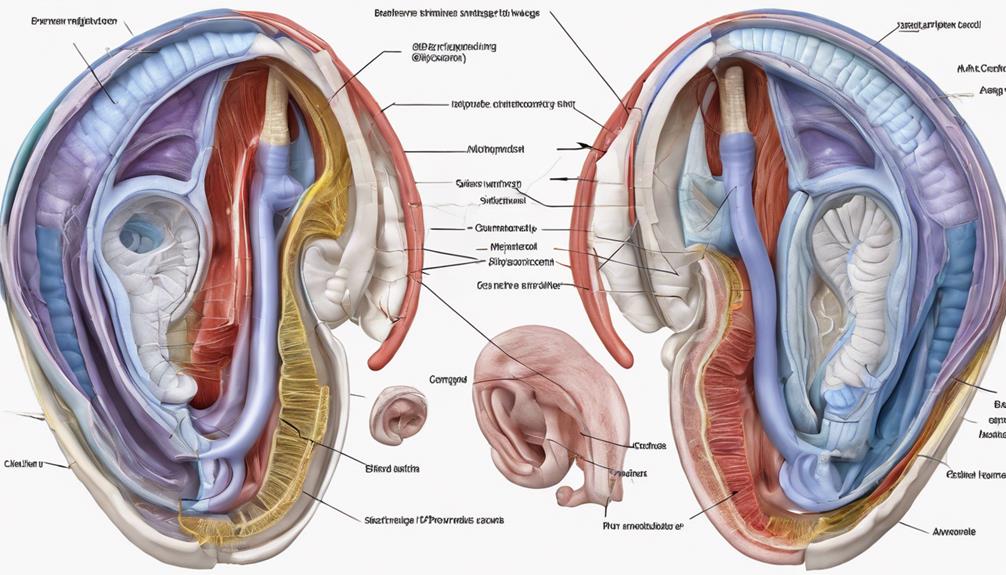Imagine your ears as delicate instruments finely tuned to capture the countless sounds that envelop you. Picture a common cold as a disruptive force, momentarily interrupting this harmonious symphony.
Have you ever wondered how a mere cold can lead to a temporary loss of hearing? Let's explore the intricate connection between nasal congestion, Eustachian tube dysfunction, and the fascinating world of ear mechanics, shedding light on why a cold can impact our ability to hear clearly.
Key Takeaways
- Cold-related hearing loss stems from upper respiratory congestion and Eustachian tube blockage.
- Nasal congestion affects hearing clarity and acuity, causing sounds to be less distinct.
- Eustachian tube dysfunction leads to fluid accumulation, resulting in muffled hearing and discomfort.
- Remedies like decongestants, hydration, rest, and warm compresses can aid in improving hearing during a cold.
Understanding the Link Between Colds and Hearing Loss
Cold-induced hearing loss stems from the intricate relationship between upper respiratory congestion and the auditory system's functionality. When a cold strikes, the body's response can lead to the accumulation of fluid in the ear, a common cause of temporary muffled hearing. This fluid buildup occurs when the Eustachian tubes, responsible for equalizing pressure in the middle ear, become blocked due to congestion, hindering the transmission of sound waves and affecting hearing. Symptoms of a cold, such as nasal congestion and throat inflammation, can exacerbate these ear-related issues, impacting the ear's ability to process sound effectively.
In most cases, as the cold subsides and congestion clears up, the temporary hearing loss also resolves. However, it's crucial to seek medical evaluation if hearing problems persist after the cold, as prolonged issues could potentially lead to more significant, long-term damage. Understanding the connection between colds, congestion, and hearing loss is essential for managing and addressing these temporary but impactful auditory challenges effectively.
Impact of Nasal Congestion on Hearing

Nasal congestion during illness can significantly impact one's hearing acuity and clarity. When experiencing a common cold, ear congestion resulting from fluid buildup in the Eustachian tubes can lead to symptoms such as muffled hearing. The congestion interferes with the transmission of soundwaves to the inner ear, causing sounds to be perceived as muffled or less distinct.
This temporary hearing loss is often accompanied by a feeling of fullness in the ears due to the fluid accumulation in the middle ear. However, as the cold symptoms resolve and the congestion clears, normal hearing should return without any lasting consequences.
Understanding the relationship between nasal congestion and hearing can help individuals manage these temporary hearing issues effectively. By addressing the underlying cause of the muffled hearing, such as by managing the cold symptoms and promoting nasal decongestion, individuals can prevent permanent damage to their hearing and ensure a swift recovery.
How Eustachian Tube Dysfunction Affects Hearing
During a cold, Eustachian tube dysfunction can disrupt normal hearing by causing fluid accumulation in the middle ear, affecting sound transmission and potentially leading to discomfort and temporary hearing loss. The Eustachian tube plays a crucial role in regulating air pressure within the middle ear. When congestion occurs, it can block the Eustachian tube, preventing proper air flow and causing muffled hearing.
This blockage not only impacts hearing but also creates an environment where bacteria and viruses can become trapped, increasing the likelihood of ear infections during a cold. Furthermore, pressure imbalances resulting from Eustachian tube dysfunction can lead to discomfort, ear pain, and temporary hearing loss.
Addressing Eustachian tube dysfunction promptly is essential to avoid potential long-term complications such as chronic ear infections and even permanent hearing loss. Proper management of Eustachian tube dysfunction is vital in safeguarding hearing health during a cold.
Remedies to Improve Hearing During a Cold

To enhance hearing during a cold, utilizing over-the-counter decongestants can be beneficial in reducing fluid accumulation in the ear. When getting a cold, congestion can lead to mucus build-up in the Eustachian tubes, hindering soundwaves to travel effectively.
Alongside decongestants, these treatment options can help improve hearing while managing the rest of your symptoms:
- Drinking Fluids: Staying hydrated aids in clearing congestion, facilitating better hearing.
- Resting: Avoiding loud noises can prevent further strain on the ears, promoting improved hearing.
- Warm Compress: Applying a warm compress to the affected ear can alleviate discomfort and enhance sound transmission.
- Seeking Medical Advice: If hearing issues persist or worsen post-cold, consulting a healthcare professional ensures appropriate treatment to prevent permanent hearing loss.
Seeking Professional Help for Cold-Induced Hearing Loss
Seeking professional evaluation for cold-induced hearing loss is crucial in determining the appropriate treatment and preventing potential long-term damage to one's hearing. When experiencing cold-related hearing issues, it is essential to schedule an appointment with a healthcare provider promptly. A doctor can conduct a thorough examination of the ear, including checking for any blockages or inflammation that may be affecting hearing. Additionally, a hearing test may be performed to assess the extent of the hearing loss caused by the cold.
| Why Seek Professional Help? | What Can Happen? |
|---|---|
| Early detection of issues | Lead to Permanent Hearing |
| Proper treatment options | Cause Temporary Hearing |
| Address underlying causes | Travel through the ear |
| Prevent long-term damage | Hearing issues |
| Expert guidance | Tubes in the ear |
Frequently Asked Questions
When Will My Hearing Come Back After a Cold?
Our hearing typically returns to normal within a few days to a week after a cold. It's common for congestion and fluid buildup in the ear to cause temporary hearing loss during a cold. As the cold symptoms improve, the muffled hearing or ear fullness usually resolves.
However, if hearing problems persist even after the cold has cleared, it's advisable to seek medical attention for further evaluation and management.
How Long Will My Ears Be Clogged After a Cold?
Our ears may remain clogged for a few days to a week after a cold due to congestion clearing. The duration of post-cold ear congestion varies based on individual immune response and cold severity.
If inflammation or fluid buildup in the Eustachian tubes persists, clogged ears may last longer. Seeking medical attention is crucial if congestion persists post-cold.
Effective remedies like decongestants or nasal sprays can help alleviate clogged ears and promote quicker recovery.
Is It Possible to Lose Hearing Temporarily?
Yes, it's possible to experience temporary hearing loss, often linked to colds and congestion. Our ears can be affected by the fluid buildup and blockages that come with a cold, causing muffled sounds and reduced ability to hear clearly.
This issue is usually reversible as the cold subsides, allowing our hearing to return to normal. If hearing problems persist post-cold, seeking medical guidance is essential for proper evaluation and treatment.
Can the Flu Cause Temporary Hearing Loss?
Yes, the flu can indeed cause temporary hearing loss. The congestion and fluid buildup associated with influenza can affect soundwave transmission to the inner ear, leading to a temporary decrease in hearing ability.
This issue typically resolves as the flu infection clears up. It's essential to seek medical attention if experiencing flu-related hearing problems to prevent potential complications and ensure proper management of symptoms.
Conclusion
Ironically, a cold may temporarily impair our ability to hear, but it also serves as a reminder of the importance of taking care of our health.
The congestion and fluid buildup may muffle our hearing, but with proper remedies and medical attention, we can overcome this obstacle.
So, while a cold may cause temporary hearing loss, it also gives us a chance to appreciate the gift of sound once it returns.











